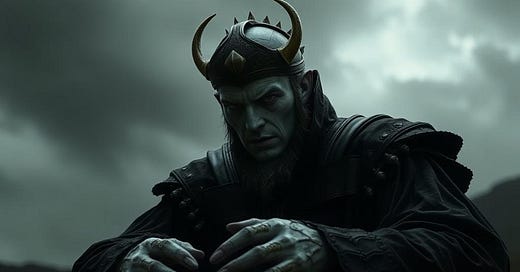Historical and Social Context
The Gunpowder Plot (1605): Written shortly after the failed assassination attempt on King James I, Macbeth reflects themes of treason and the dangers of regicide.
Divine Right of Kings: The belief that monarchs were chosen by God is central to Macbeth, with Duncan’s murder portrayed as an attack on the natural order.
King James I’s Reign: Shakespeare wrote the play to please James I, who was fascinated by witchcraft and traced his lineage back to Banquo.
Witchcraft Hysteria: The play taps into the fear of witches, which was rampant in 17th-century England and Scotland. James I even authored a book on demonology.
Scotland’s History: The play is loosely based on real historical events, drawing from Holinshed’s Chronicles, though Shakespeare significantly altered facts for dramatic purposes.
Literary and Theatrical Context
Tragedy Genre: Macbeth is a classic tragedy, focusing on the fatal flaw (ambition) of its protagonist and the catastrophic consequences.
Use of Soliloquies: Macbeth’s soliloquies offer insight into his inner turmoil and moral conflict, a hallmark of Shakespearean drama.
Dramatic Irony: The audience often knows more than the characters, heightening the tension, such as when Duncan trusts Macbeth, unaware of his plans.
The Supernatural: Ghosts, visions, and the witches’ prophecies add a sense of otherworldly influence, reflecting the Elizabethan fascination with the occult.
Elizabethan and Jacobean Theatre: Macbeth was performed in open-air theaters like the Globe, with all roles (including Lady Macbeth) played by men.
Cultural and Philosophical Context
Ambition and Morality: The play examines unchecked ambition and its destructive effects, a theme relevant to both personal and political power.
Order vs. Chaos: Killing the king disrupts the Great Chain of Being, leading to chaos in nature and society.
Fate vs. Free Will: The tension between destiny and choice is a central question, as Macbeth struggles with whether he controls his own actions or is doomed by prophecy.
Guilt and Conscience: Lady Macbeth’s and Macbeth’s descent into madness underscores the psychological toll of guilt.
Masculinity and Power: The play explores the relationship between masculinity, ambition, and violence, with Lady Macbeth challenging traditional gender roles.
Political and Social Critique
A Cautionary Tale: Macbeth warns against the dangers of overreaching ambition and disloyalty to the crown, aligning with King James I’s concerns about treason.
The Tyranny of Macbeth: The play critiques tyrannical rule, contrasting Macbeth’s bloody reign with Duncan’s benevolence.
Social Hierarchy: The upheaval caused by Duncan’s murder reflects the importance of maintaining societal and cosmic order.
Mistrust and Paranoia: Themes of betrayal and suspicion mirror the political climate of Shakespeare’s time, particularly after the Gunpowder Plot.
Role of Women: Lady Macbeth’s ambition and manipulation challenge Elizabethan expectations of women, while her eventual downfall reinforces traditional gender norms.






